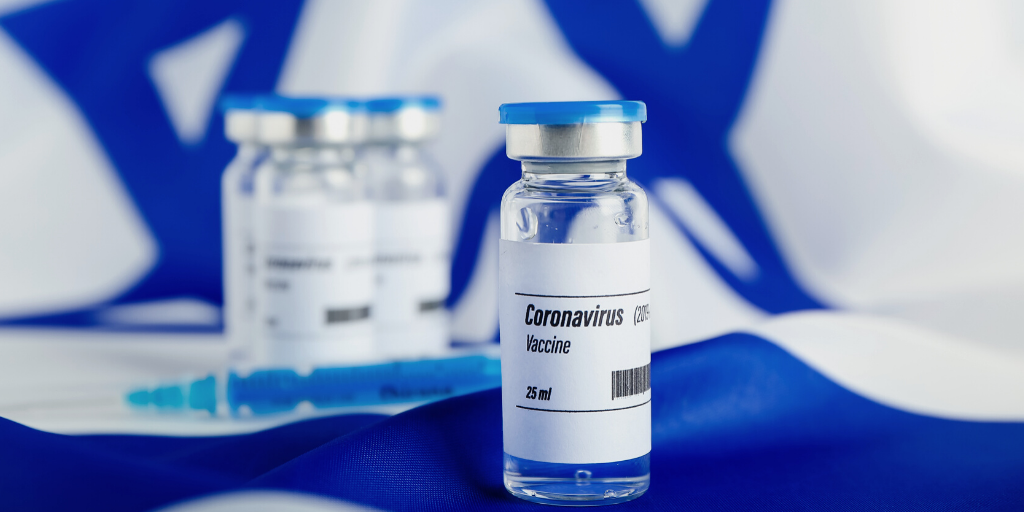FRESH AIR
Israel’s vaccination success by the numbers
February 18, 2021 | Judy Maynard

It may still be early days, but the first statistical data from Israel’s world-beating rollout of the Pfizer-BioNTech COVID-19 vaccine appear very encouraging. Even allowing for the particularly challenging health conditions facing the country, the vaccine’s performance in the community has been as efficacious as it was found to be in clinical trials.
On Feb. 14, Clalit, Israel’s largest health fund, released the results of a study of 1.2 million people, half of whom had received the vaccine while the other half had not. It showed 94% fewer symptomatic COVID-19 cases and, of those who did catch it, 92% fewer serious cases in those who’d been vaccinated. The vaccine appears to be at its most effective from seven days after the second dose.
This has mirrored results from Pfizer’s clinical trials which demonstrated 95% efficacy in preventing COVID-19 a week or more after the second dose had been administered. Partial protection appeared to start from 12 days after the first dose.
The Clalit study has shown the vaccine to have been equally effective across different age groups. The 600,000 strong control group had been carefully selected to display similar characteristics to the vaccinated group, such as age and health status. With respect to age, Clalit’s chief innovation officer, Dr Ran Balicer, stated that whereas the Pfizer study had lacked sufficient data, it was now clear following the rollout that the vaccine prevents serious illness among those aged over 70.
Clalit’s results were consistent with those of another Israeli healthcare network, Maccabi, which found an effectiveness rate of 93%. After vaccinating half a million people with both doses of the Pfizer vaccine, Maccabi reported that only 544 (0.1%) were later diagnosed with the disease, and only four cases among those infected after vaccination were serious. No one who was vaccinated died.
These results have been made possible by Israel’s rapid and high rate of vaccination. The program commenced on Dec. 20, 2020. By mid-February 2021 more than 3.9 million Israelis – 44% of the population – had received their first dose, 2.6 million of whom had also received the second.
It has not been an easy time. Four days after the rollout commenced, the highly-contagious UK variant was detected in four cases in Israel. It now accounts for some 80% of new cases. Throughout January, COVID numbers spiked, with deaths reaching a daily peak of 101 on Jan 20. The country went into lockdown on Jan. 8, and has only just emerged.
Professor Eran Segal, a computational biologist at the Weizmann Institute, notes that the greatest reductions in cases were seen in those age groups and locations that vaccinated first, providing good evidence that it was the vaccine and not the lockdown that made the difference.
Other findings
- Professor Segal, who has been analysing data for the Israeli Ministry of Health, has reported that since the mid-January crisis there has been:
- a 38% reduction in seriously ill patients;
- a 40% fall in the number of deaths among those aged over 60;
- 58% fewer new patients from older cohorts;
- and 44% fewer hospitalisations generally.
- The Pfizer vaccine appears to be equally effective against the UK variant strain. Prof. Shlomo Vinker, who heads the medical division of Israeli health fund Leumit Health Services which also conducted a study, stated, “After a complex analysis that averaged different populations, ages and location along a timeline, we concluded that the vaccine protected against the British mutant equally effectively as compared to the original virus.”
- Bar-Ilan University and Safed’s Ziv Medical Center conducted a small study amongst multi-ethnic healthcare workers which found that, after a single dose of the Pfizer vaccine, previously infected people demonstrated a strong immune response. This may indicate that one dose is sufficient for those who have already had COVID-19. If correct, this is potentially significant for countries lacking sufficient supplies of the vaccine.
- Data from Israel’s largest COVID-19 testing centre suggests that even if vaccinated individuals do become infected, they are less likely to pass the virus on to others, thereby helping reduce transmission.
Ongoing monitoring of the data will offer other insights and could shed light on the vaccine’s efficacy amongst targeted groups such as diabetics, pregnant women and cancer patients, as well as the point at which herd immunity takes effect, and begins to protect the unvaccinated minority as well as those vaccinated.
Israel’s universal healthcare and digitised health system provide Pfizer with a unique opportunity to monitor the effectiveness of its vaccine, and Israeli data collection certainly seems to have paid off, both for Pfizer and for any governments or institutions seeking to use scientific best practice to make decisions about how to address the pandemic.
Tags: COVID-19, Israel, Pfizer, Vaccine, coronavirus
RELATED ARTICLES

US Middle East strategy amid regional instability: Dana Stroul at the Sydney Institute

Antisemitism in Australia after the Bondi Massacre: Arsen Ostrovsky at the Sydney Institute





















